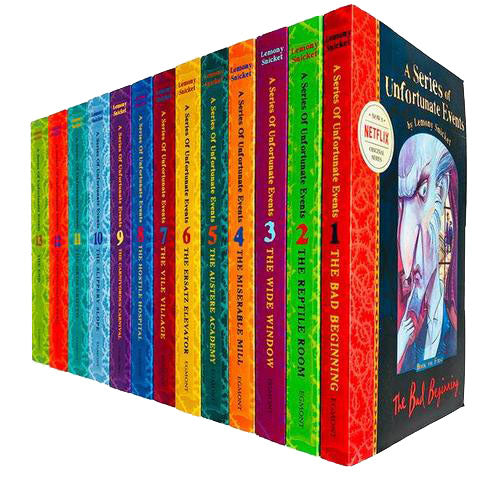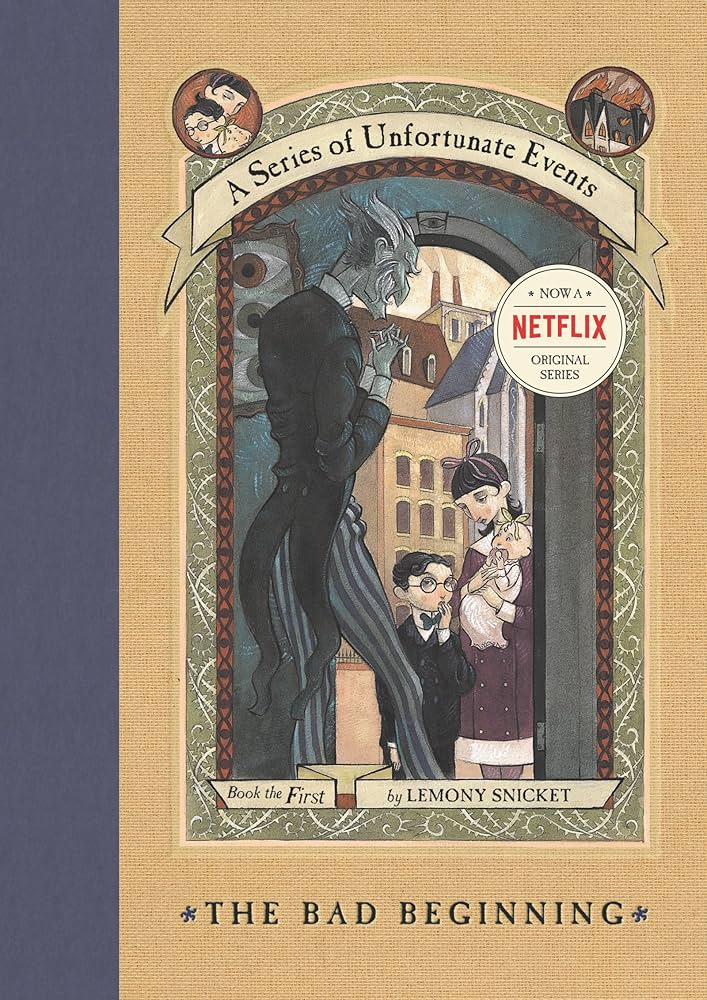Lemony Snicket Books: A Deep Dive into a Series of Unfortunate Events

Lemony Snicket’s A Series of Unfortunate Events is more than just a children’s book series; it’s a literary phenomenon that has captivated readers of all ages with its dark humor, witty prose, and enduring themes. This exploration delves into the world of Lemony Snicket’s books, examining various aspects from literary analysis to their cultural impact, utilizing the framework of a book-focused website.
1. Books: Exploring the Genres and Literary Merit of A Series of Unfortunate Events
The thirteen books comprising A Series of Unfortunate Events defy easy genre categorization. While primarily marketed as children’s literature, their sophisticated vocabulary, complex narrative structure, and exploration of adult themes like death, loss, and betrayal firmly place them within the realm of young adult and even adult fiction. The series skillfully blends elements of mystery, gothic fiction, dark humor, and even satire, creating a unique and engaging reading experience.

1.1 Genre-bending Narratives:
Snicket masterfully subverts expectations associated with traditional children’s literature. The books are not simple tales of good versus evil; instead, they present a morally ambiguous world where good intentions frequently lead to disastrous outcomes. The recurring theme of misfortune, coupled with Snicket’s sardonic narration, establishes a tone far removed from the usual lightheartedness of children’s stories. This unique blend appeals to a broad audience, drawing readers in with its dark humor while simultaneously engaging them with intellectually stimulating themes.
1.2 Literary Style and Craftsmanship:

Snicket’s writing style is a significant contributor to the series’ success. His prose is elegant and erudite, employing a vocabulary often beyond the typical range of children’s literature. This stylistic choice, however, is not gratuitous; the complex vocabulary is intertwined with Snicket’s metafictional narration, where he directly addresses the reader, often warning them against reading further. This self-aware narrative strategy enhances the story’s dark humor and adds layers of complexity, making the books as much about the act of reading as about the story itself.

1.3 Bestsellers and Enduring Popularity:
The A Series of Unfortunate Events books have achieved significant commercial success, cementing their status as bestsellers. Their enduring popularity stems from their ability to resonate with readers on multiple levels. Children enjoy the engaging plot, quirky characters, and the thrilling escapades of the Baudelaire orphans. Adults appreciate the series’ literary merit, the sharp social commentary, and the dark humor that simultaneously entertains and prompts reflection on various societal issues. This broad appeal ensures the books’ continued relevance and sales in the contemporary literary landscape.
2. Authors: Unveiling the Genius Behind Lemony Snicket
Lemony Snicket, the pen name of Daniel Handler, is a master storyteller who skillfully crafted a world of perpetual misery and darkly comedic situations. While the author himself remains somewhat enigmatic, his work offers glimpses into his creative process and inspirations.
2.1 The Persona of Lemony Snicket:
The use of a pseudonym and the consistent adoption of a fictional narrator persona is a remarkable aspect of the series. Lemony Snicket, the narrator, is not just a detached observer but an active participant in the narrative, constantly addressing the reader, expressing his disapproval of the events unfolding, and offering (often sarcastic) advice. This metafictional approach blurs the lines between author and narrator, adding depth and complexity to the storytelling. The character of Lemony Snicket, therefore, is as crucial to the series’ success as the Baudelaire orphans’ adventures themselves.
2.2 Inspirations and Influences:
Handler has cited various influences shaping A Series of Unfortunate Events, including authors like Roald Dahl, Charles Dickens, and Edward Gorey. Dahl’s penchant for dark humor and outrageous characters is evident in Count Olaf’s outrageous personality and the series’ many outlandish scenes. Dickens’s social commentary and focus on orphaned characters resonates strongly in the plight of the Baudelaire orphans and the exploration of societal failings. Gorey’s distinctive style of macabre illustration and whimsical darkness has had a significant influence on both the textual and visual aspects of the series.
2.3 Famous Works Beyond A Series of Unfortunate Events:
While A Series of Unfortunate Events remains Handler’s most famous work, he has authored other notable books demonstrating his diverse literary talents. His other works, including The Basic Eight, We Are Pirates, and the All the Wrong Questions series, showcase his versatility and skill as a writer. These diverse projects help to showcase Handler’s range and highlight the creativity extending beyond the umbrella of his famous pseudonym, Lemony Snicket.
3. Reading and Learning: Unpacking the Educational and Moral Value of the Series
Despite its dark tone, A Series of Unfortunate Events provides significant educational and moral value for young readers.
3.1 Educational Value: Vocabulary and Literary Appreciation:
Snicket’s use of sophisticated vocabulary is a key element of the series’ educational value. While the vocabulary may challenge younger readers, it simultaneously expands their linguistic horizons, encouraging them to engage with new words and their meanings. Furthermore, the series’ clever wordplay, puns, and literary allusions introduce readers to the richness and subtleties of the English language and spark interest in exploring literature beyond the confines of the series.
3.2 Life Lessons: Resilience, Resourcefulness, and the Importance of Family:
Despite the constant hardships, the Baudelaire orphans exhibit impressive resilience and resourcefulness in the face of adversity. Their ability to adapt, their perseverance, and their unwavering sibling bond offer valuable life lessons for young readers. The series subtly underscores the importance of family and the strength that comes from mutual support. Even in a world filled with misfortune, the bond between Violet, Klaus, and Sunny serves as a beacon of hope and resilience.
3.3 Critical Thinking and Moral Ambiguity:
A Series of Unfortunate Events challenges readers to engage in critical thinking. The series does not offer simplistic moral lessons, instead it presents a complex world of moral ambiguity, inviting readers to grapple with the nuances of good and evil. Count Olaf is an over-the-top villain, but the adults surrounding the Baudelaires, while well-intentioned, are frequently incompetent and ineffective. This complexity fosters critical analysis and encourages readers to question the world around them.
4. Libraries: The Series’ Place in Physical and Digital Collections
The enduring popularity of A Series of Unfortunate Events is reflected in its presence in both physical and digital libraries worldwide.
4.1 Public Libraries:
The books are staples in most public libraries, providing accessible reading material for children and young adults. Their presence in these libraries ensures that a wider audience, including those from less privileged backgrounds, can access and enjoy the books. This accessibility is a crucial factor in ensuring the series’ widespread impact.
4.2 Digital Libraries:
The digital accessibility of A Series of Unfortunate Events through online libraries and e-book platforms further extends its reach. This digital format enables individuals around the globe to access the series regardless of geographical location or physical access to traditional libraries. This widespread digital distribution has been instrumental in fostering the series’ global fanbase.
4.3 Rare Collections and Archives:
First editions and special editions of the books hold a place in rare book collections and literary archives, highlighting the series’ position within the broader canon of children’s literature and its value as a cultural artifact.
5. Cultural Impact: Adaptations, Awards, and Communities
A Series of Unfortunate Events has had a significant cultural impact, extending beyond the printed page.
5.1 Literary Influence:
The series has influenced other writers, inspiring a new wave of children’s literature that embraces darker themes and more sophisticated narrative structures. The series’ unique combination of humor and tragedy, its metafictional approach, and its use of sophisticated vocabulary have served as inspiration to contemporary writers.
5.2 Adaptations:
The series has been adapted into a successful Netflix television series, which maintains the series’ dark humor and thematic complexities while visually translating the story’s unique aesthetic. This adaptation has broadened the series’ appeal to an even wider audience, introducing new fans to Snicket’s work.
5.3 Awards and Recognition:
The A Series of Unfortunate Events books have received numerous awards and accolades, recognizing their literary merit and cultural significance.
5.4 Communities:
The series has fostered passionate communities of fans online and offline, who engage in discussions, share their interpretations, and celebrate their shared love for the books. This community engagement speaks to the lasting power and emotional impact of Lemony Snicket’s work. The creation of online forums, fan-created art, and the collective appreciation of the unique stylistic choices have demonstrated the strong cultural impact of this genre-bending book series. The ongoing conversations and engagement highlight the lasting impact of the books on the literary landscape.
In conclusion, Lemony Snicket’s A Series of Unfortunate Events is a multifaceted and richly layered work of literature. Its ability to appeal to a broad audience, its literary merit, and its cultural impact secure its place as a significant contribution to children’s and young adult literature. The series’ ongoing relevance is a testament to its enduring appeal and the genius of its creator.